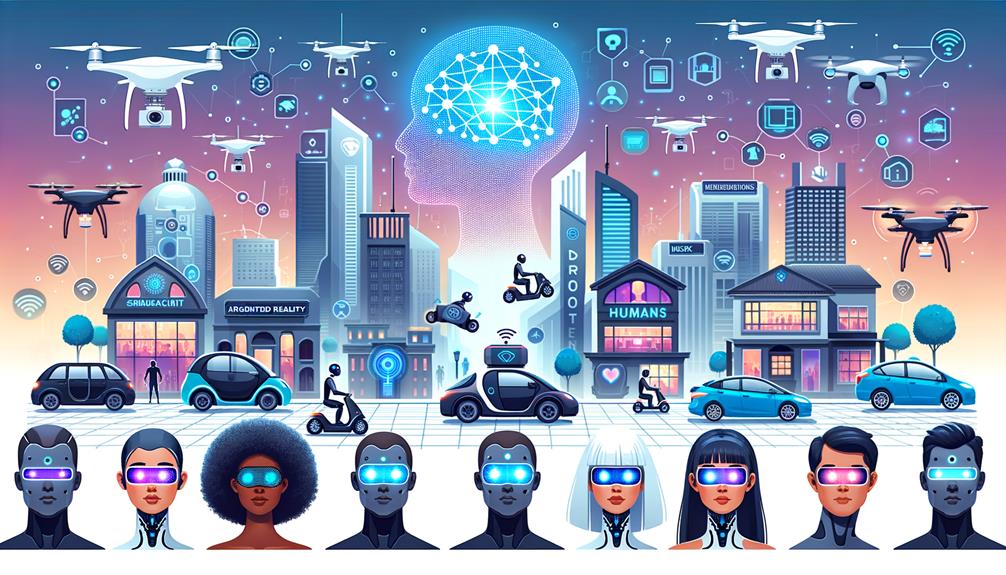

Vous vivez déjà avec l'IA, que vous le réalisiez ou non. Assistants numériques gérer votre emploi du temps et vos tâches, tout en des recommandations personnalisées améliorer vos expériences d'achat et de divertissement. Appareils domestiques intelligents Les applications de navigation vous aident à éviter les embouteillages. L'IA est aussi transformer les industries L'IA est un outil qui permet d'améliorer l'efficacité des services publics, notamment dans les domaines de l'éducation, de la santé et de l'entreprise. À mesure que l'IA continue d'évoluer, elle façonne les normes et les pratiques sociétales futures. Vous n'avez vu qu'un aperçu de l'impact de l'IA sur votre vie quotidienne - et il y a encore beaucoup à découvrir sur la façon dont l'IA peut vous aider à atteindre vos objectifs. intelligence artificielle[1] change le monde.
Votre vie quotidienne est probablement influencée par l'IA de plus de façons que vous ne le pensez, de la assistants numériques qui vous aident à gérer votre emploi du temps au des recommandations personnalisées qui façonnent vos expériences de divertissement et d'achat.
Les algorithmes d'IA apprennent constamment et s'adaptent à vos habitudes, rendant vos interactions quotidiennes avec la technologie plus personnalisées et plus efficaces.
Les appareils domestiques intelligents, par exemple, vous permettent de contrôler facilement l'éclairage, le chauffage et les systèmes de sécurité, ce qui rend votre vie plus pratique.
Pendant que vous vaquez à vos occupations, l'intelligence artificielle applications de navigation vous aident à vous orienter dans le trafic, tandis que des assistants numériques comme Siri et Alexa répondent à vos commandes vocales.
Les intégration transparente L'intégration de l'IA dans votre vie quotidienne modifie la façon dont vous interagissez avec la technologie.
S'appuyer sur les moyens AI influence déjà la vie quotidienne, elle produit également de nombreux avantages qui transforment le fonctionnement des entreprises, le travail et la vie des individus.
Grâce à l'IA, on observe des améliorations significatives dans les domaines suivants l'efficacité dans différents secteurs, ce qui pourrait stimuler PIB mondial de $15,7 trillions d'ici à 2030. Vous bénéficiez également d'une plus grande précision en matière de les processus décisionnelsce qui réduit les coûts opérationnels des entreprises.
Les recommandations personnalisées alimentées par l'IA améliorent votre expérience client[2]ce qui permet de trouver plus facilement ce que l'on cherche. En outre, l'IA crée de nouvelles opportunités d'emploi dans le domaine de la technologie et des domaines connexes.
À mesure que l'IA continue de s'intégrer dans les processus d'entreprise, vous pouvez vous attendre à voir apparaître des solutions encore plus innovantes qui stimulent la croissance, améliorent la commodité et augmentent la productivité.
L'IA transforme le paysage des médias numériques en exploitant le comportement et les préférences des utilisateurs pour créer des expériences sur mesure qui stimulent l'engagement et la satisfaction.
Vous connaissez sans doute des recommandations de contenu personnalisées sur des plateformes telles que Netflix et Spotify, qui utilisent des Algorithmes pilotés par l'IA pour analyser votre comportement et vous suggérer des contenus qui vous correspondent.
Technologies de traitement du langage naturel, telles que les chatbots et les assistants virtuelsLes systèmes d'information et de communication sont également utilisés pour faciliter l'accès à l'information et à la formation. des interactions transparentes entre les utilisateurs et les médias numériques.
En outre, les outils d'IA sont utilisés dans les domaines suivants production de médias numériques créer des personnages et des environnements réalistes grâce à des techniques avancées d'imagerie de synthèse.
Des modèles d'apprentissage automatique sont également utilisés pour détecter et filtrer les contenu préjudiciable sur les médias sociaux, améliorant ainsi l'expérience et la sécurité des utilisateurs.
Ces innovations révolutionnent la façon dont vous consommez et interagissez avec les médias numériques.
De nombreux établissements d'enseignement dans le monde entier exploitent aujourd'hui la puissance de l'Internet. intelligence artificielle pour créer des expériences d'apprentissage plus personnalisées, plus efficaces et plus efficientes pour les étudiants.
Vous trouverez des plateformes pilotées par l'IA qui transforment les programmes d'études et de diplômes en intégrant les éléments suivants technologies d'apprentissage adaptatifL'objectif est de rendre l'éducation plus accessible et plus efficace.
Grâce à l'IA, vous obtiendrez retour d'information en temps réelpermettant aux éducateurs d'ajuster en temps utile les méthodes d'enseignement et les programmes pour mieux vous aider.
L'IA personnalise également les expériences d'apprentissage en analysant les données individuelles de l'élève, en créant des des plans d'apprentissage sur mesure pour répondre à des besoins divers. Cela devrait améliorer considérablement l'engagement et les résultats des étudiants.
En tant que demande[5] pour les professionnels qualifiés dans l'IA et la science des données augmente, les institutions intègrent. Cours liés à l'IA dans leurs programmes d'études afin de vous préparer aux futurs marchés de l'emploi.
Les marché du travail est à l'aube d'une transformation significative, la technologie remplaçant certains rôles tout en créant de nouvelles opportunités qui requièrent un ensemble différent de compétences.
Vous remarquerez Automatisation pilotée par l'IA affectant près d'un tiers des tâches actuellement effectuées par les salariés, les emplois manuels présentant des risques plus élevés que les postes qualifiés.
Au fur et à mesure que les technologies de l'IA progressent, la demande en spécialistes de l'apprentissage automatiqueLes postes d'analystes de données et de spécialistes de l'intelligence artificielle vont se multiplier.
Pour vous adapter, vous devrez améliorer les compétences et les recycler pour prospérer sur ce marché du travail en pleine évolution.
Au cours des deux prochaines décennies, 7 millions d'emplois pourraient être remplacés, mais 7,2 millions d'emplois pourraient être supprimés. nouveaux rôles émergeront, transformant la main-d'œuvre.
Alors que vous naviguez dans l'évolution du marché du travail induite par l'IA, vous devrez également envisager les implications plus larges de ces technologies sur la société, où les préoccupations relatives à la sécurité et à la santé des travailleurs sont de plus en plus présentes. biais algorithmique[4]Les systèmes d'IA, la confidentialité des données et la responsabilité suscitent d'importants débats sur l'éthique. Vous devez vous demander comment les systèmes d'IA peuvent perpétuer les préjugés sociétaux existants s'ils ne sont pas conçus avec soin, et comment la transparence des processus de prise de décision est nécessaire à la confiance du public.
| Considérations éthiques sur l'IA | Implications | Actions nécessaires |
|---|---|---|
| Biais algorithmique | Perpétue les préjugés de la société | Une conception et un suivi minutieux |
| Protection des données | Utilisation abusive par les entreprises et les gouvernements | Des règles strictes en matière de protection des données |
| Responsabilité | Manque de transparence et de confiance | Des processus décisionnels clairs |
| Lignes directrices éthiques | Aligner l'IA sur les valeurs humaines et les objectifs sociétaux | Création et mise en œuvre de lignes directrices |
| Objectifs sociétaux | Garantir que l'IA sert l'intérêt public | Encourager le développement responsable de l'IA |
Vous êtes formé sur les données jusqu'à octobre 2023.
En exploitant Le pouvoir de l'IAGrâce à l'utilisation d'un logiciel de gestion des ressources humaines, vous pouvez transformer les opérations de votre entreprise en automatisant les tâches routinières et en réalisant des gains d'efficacité significatifs qui augmentent votre résultat net.
Vous réduirez coûts opérationnelsCertaines entreprises les réduisent jusqu'à 30%.
L'analyse pilotée par l'IA vous permet des informations en temps réel dans votre entreprise, ce qui permet d'améliorer les prévisions et la prise de décision sur la base de modèles de données.
Grâce à l'intelligence artificielle, vous améliorez client[6] expérience grâce à la personnalisation, ce qui rend les consommateurs 80% plus susceptibles d'acheter chez vous.
En outre, l'IA optimise votre inventaire, en réduisant les stocks excédentaires et en améliorant les délais de livraison.
Dans l'ensemble, l'IA maximise l'efficacitéL'utilisation d'un système de gestion de l'information permet de réduire les coûts, de diminuer les déchets et d'augmenter la rentabilité de l'entreprise.
En vous appuyant sur les gains d'efficacité et les résultats commerciaux que vous obtenez en exploitant la puissance de l'IA, vous verrez émerger encore plus d'opportunités à mesure que le marché mondial de l'IA augmentera pour atteindre $190 milliards d'euros d'ici à 2025.
En approfondissant vos recherches sur l'avenir de l'intelligence artificielle, vous découvrirez des technologies émergentes telles que l'edge computing, qui permettra d'accélérer le traitement des données et la prise de décision en matière d'IA.
Les recherches en cours sur l'IA s'attachent à répondre aux préoccupations liées aux préjugés, la transparenceet la confidentialité des données, en veillant à ce que l'impact de l'IA sur la vie quotidienne soit positif.
On peut s'attendre à ce que l'IA soit de plus en plus intégrée dans la vie quotidienne, favorisant l'innovation et la productivité.
L'avenir de l'IA étant prometteur, vous aurez de nombreuses occasions d'explorer de nouvelles applications et avancées.
Si l'impact de l'IA se fait sentir dans différents secteurs, ses applications dans le domaine de la santé sont particulièrement transformatrices, car elles révolutionnent la manière dont les professionnels de la santé diagnostiquent, traitent et interagissent avec les patients. Vous bénéficiez d'une meilleure précision de diagnostic, les systèmes d'IA étant plus performants que les radiologues humains dans la détection de maladies telles que le cancer du sein. Les algorithmes pilotés par l'IA permettent une médecine personnalisée, en adaptant les plans de traitement aux profils génétiques individuels.
| Application de l'IA | Description | Impact |
|---|---|---|
| Précision du diagnostic | Diagnostic assisté par l'IA | Précision jusqu'à 94% |
| Médecine personnalisée | Plans de traitement sur mesure | 30% amélioration de l'efficacité |
| Télémédecine | Consultations virtuelles | 150% augmentation de l'accès |
| Traitement du langage naturel | Rationalisation des tâches administratives | 30% réduit la charge de travail des cliniciens |
| Découverte de médicaments | Analyse pilotée par l'IA | Identification plus rapide des médicaments candidats |
Grâce à l'IA, vous bénéficiez de diagnostics plus précis, de traitements efficaces et de soins de santé accessibles.
En tant que L'influence de l'IA s'étend à presque tous les aspects de votre vie, son côté obscur commence à émerger, posant risques importants et des défis qui menacent de saper ses nombreux avantages.
Il est probable que vous rencontriez des systèmes d'intelligence artificielle qui perpétuent préjugésLes résultats de l'analyse de l'image de l'entreprise peuvent être discriminatoires dans des domaines tels que la reconnaissance faciale et l'embauche.
Votre données personnelles est également menacée, car la dépendance de l'IA à l'égard de vastes ensembles de données pose d'importants problèmes de protection de la vie privée.
La responsabilité est un autre défi, en particulier pour les applications d'IA autonomes telles que les voitures auto-conduites.
En outre, le l'impact sur l'environnement de l'IA s'accroît, les grands modèles consommant des quantités massives d'énergie et augmentant les émissions de carbone.
Alors que l'IA continue d'évoluer, il est essentiel de s'attaquer de front à ces risques et à ces défis afin de garantir que ses avantages soient équitablement répartis et que ses conséquences négatives soient atténuées.
"Les fils invisibles de l'IA enrichissent votre quotidien, vous offrant une commodité sans faille, améliorant la communication, surveillant la santé, révolutionnant l'éducation et électrisant les divertissements, faisant de chaque instant une expérience envoûtante."
Vous ressentez déjà l'impact de l'IA, mais vous verrez encore plus de changements avec l'éthique émergente de l'IA, l'automatisation accrue du travail, l'apprentissage personnalisé élargi, les solutions de soins de santé innovantes et les maisons plus intelligentes qui anticipent vos besoins et s'adaptent en conséquence.
Vous utilisez probablement l'IA dans votre vie quotidienne sans vous en rendre compte. Vous pouvez exploiter l'assistance de l'IA pour les maisons intelligentes, la gestion des finances personnelles, le suivi de la santé et l'apprentissage virtuel, ce qui rend votre vie plus facile et plus efficace chaque jour.
Comme le dit le proverbe, "le changement est la seule constante". Vous verrez l'IA révolutionner le monde, soulever des considérations éthiques, provoquer des déplacements d'emplois et favoriser les innovations en matière de soins de santé, la transformation de l'éducation et les préoccupations relatives à la protection de la vie privée qui remodèleront le tissu social."